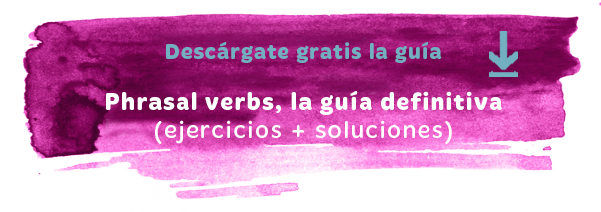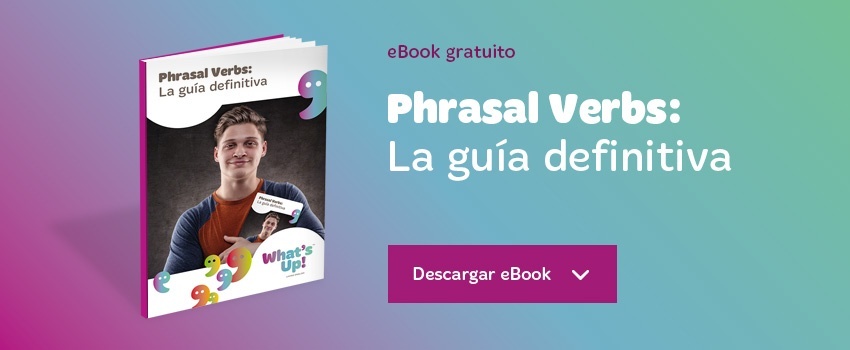What's Up! blog
el mejor contenido del mejor curso de inglés
Los 20 phrasal verbs más usados en inglés con ejemplos [2026]
Aprender los phrasal verbs más usados es una muy buena forma de dar un impulso a tu nivel de inglés. Y es que estas construcciones son muy utilizadas en este idioma, y esenciales para comprender textos, seguir conversaciones y comunicarse en general.
A continuación te mostramos los 20 verbos frasales más comunes, con ejemplos de uso que te ayudarán a comprenderlos e interiorizarlos con facilidad.
¿Qué son los phrasal verbs?
Los phrasal verbs en inglés son verbos compuestos formados por un verbo + una partícula (adverbio y/o preposición) que cambia o matiza su significado. A veces, se trata de un pequeño cambio en el significado del verbo (un matiz) pero, en otras ocasiones, comporta un cambio radical.
Los phrasal verbs son famosos entre los estudiantes que están aprendiendo inglés… y no precisamente por las simpatías que despiertan. Estos verbos están entre los errores más comunes de los españoles en inglés ya que, como te explicamos en este artículo, se trata de una estructura con la que no estamos familiarizados en nuestro idioma materno.
Por este motivo, son tan difíciles de aprender (muchas veces no queda más remedio que aprenderlos de memoria). Sin embargo, existen algunos phrasal verbs, los más usados, que te pueden ayudar a dominar la lengua.
Existen varias razones más por las cuales estas construcciones resultan difíciles para los hispanohablantes. Para empezar, la lista de phrasal verbs es larguísima: existen más de 10.000. Muchos de ellos parten de un mismo verbo, unido a distintas partículas en cada caso. Además, algunos tienen múltiples significados y la mayoría suelen ser no literales (idiomáticos). Así que el ejercicio de memoria requerido para dominarlos es importante.
Pero no te preocupes, practice makes perfect! Empecemos con los phrasal verbs más usados y ya irás ampliando tu listado con el tiempo.
¿Cuántos tipos de phrasal verbs hay?
En inglés existen 3 clases de verbos frasales, que son los siguientes:
- Intransitivos: no llevan objeto.
- We have to wake up at 8 in the morning. – Tenemos que despertarnos a las 8 de la mañana.
- Transitivos separables: deben llevar un objeto, que puede ir en medio o después del verbo.
- Please, turn off the light. / Please, turn the light off. – Por favor, apaga la luz.
- Transitivos inseparables: deben llevar un objeto, que debe ir siempre después del phrasal verb.
- My mother will look after the children. – Mi madre cuidará de los niños.
Lista de los 20 phrasal verbs más usados
Los verbos frasales son imprescindibles para que domines el inglés coloquial, y la mejor manera de aprenderlos es… ¡que los veas en contexto! Para ayudarte, aquí tienes una lista de los 20 phrasal verbs más usados con un ejemplo de uso de cada uno.
Si clicas los phrasal verbs remarcados en lila, accederás a contenido adicional para seguir aprendiendo sobre esta temática.
| Phrasal verbs más usados | Significados | Ejemplos |
| Back up | Apoyar. También puede significar “dar marcha atrás” o “hacer una copia de seguridad”. |
The rest of the team backed her up when she told management about her plans. – El resto del equipo la apoyó cuando le explicó sus planes a la Gerencia. |
| Bring up | Mencionar algo. | Don’t bring up the budget during the meeting, please. – No menciones el presupuesto durante la reunión, por favor. |
| Carry out | Llevar a cabo. | The company is carrying out a plan to increase salaries by 20% next year. – La empresa está llevando a cabo un plan para subir los sueldos un 20% el año que viene. |
| Come across | Encontrarse con alguien por casualidad. | I went to the park and came across your brother – he looked so grown up now! – Fui al parque y me encontré a tu hermano. ¡Se le ve muy crecido, ahora! |
| Come up with | Ocurrirse (una idea, solución…). | Remember our IT problem? Well, Carlos has come up with a great solution! – ¿Te acuerdas de nuestro problema informático? ¡Pues a Carlos se le ha ocurrido una solución genial! |
| Drop off | Dejar a alguien en un sitio. | Marcos is dropping me off at the airport today. – Marcos me dejará en el aeropuerto hoy. |
| Find out | Averiguar. | María got promoted when they found out she had excellent business skills. – María fue ascendida cuando averiguaron que tiene unas habilidades de negocios excelentes. |
| Get along | Llevarse bien. | Do you get along with your English teacher? I think she’s really cool. – ¿Te llevas bien con tu profesora de inglés? Yo creo que es muy guay. |
| Get back to | Responder más tarde. | Let me check out some numbers and I will get back to you with an answer this afternoon. – Déjame comprobar algunos números y te responderé algo esta tarde. |
| Get over | Superar. | He has gotten over his breakup quite well, don’t you think? – Ha superado su ruptura bastante bien, ¿no crees? |
| Give up | Dejar un hábito.
También puede significar “rendirse”. |
I gave up smoking last May. – Dejé de fumar el pasado mes de mayo. |
| Hurry up | Darse prisa. | Hurry up or we will never make it in time! – ¡Date prisa o nunca llegaremos a tiempo! |
| Look after | Cuidar de alguien. | I’m looking after the children while my sister is at work. – Cuido de los niños mientras mi hermana está en el trabajo. |
| Make up | Recuperar.
Otros posibles significados: hacer las paces, maquillarse, inventar… |
He is making up for lost time. – Está recuperando el tiempo perdido. |
| Pick up | Recoger.
También puede significar “aprender por casualidad”. |
Can you pick me up at the train station? – ¿Puedes recogerme en la estación de tren?
I picked up some French while I was living in Paris. – Aprendí un poco de francés cuando vivía en París. |
| Point out | Señalar. | Thanks for pointing this out, John – otherwise we would have made a big mistake. – Gracias por señalar eso, John; si no hubiésemos podido cometer un gran error. |
| Set up | Fundar, establecer. | I have always wanted to set up my own freelance business. – Siempre he querido fundar mi propio negocio. |
| Turn on/Turn off | Encender/apagar. | Can you turn the lights off when you leave, please? – ¿Puedes apagar las luces cuando te vayas, por favor? |
| Turn out | Ocurrir de manera diferente a lo esperado. | As it turns out, John didn’t get the job in Advertising – he is going to Australia for a gap year instead. – Resulta que John no consiguió el trabajo en publicidad; en su lugar, se irá a Australia para tomarse un año sabático. |
| Turn up | Llegar o aparecer. | Mike hasn’t turned up yet. Do any of you know where he is? – Mike aún no ha llegado/aparecido. ¿Alguien sabe dónde está? |
¿Cómo aprender verbos frasales de forma efectiva?
Aquí tienes algunos tips para aprender los phrasal verbs más usados y todos los que desees:
- Aprenderlos en contexto, en lugar de hacerlo de memoria, te será más sencillo.
- Agruparlos por verbo base. Muchos phrasal verbs se forman con un mismo verbo (get, take, put, etc.), y agruparlos así a la hora de estudiar puede ayudarte a no confundirlos entre ellos.
- Usar tarjetas de memoria. Escribir tus flashcards es un buen sistema de memorización.
- Escuchar canciones y series en inglés.
- Practicar escribiendo tus propias frases. Está probado que hacer un ejercicio como el de pensar en oraciones y escribirlas potencia la memorización.
Phrasal verbs organizados por verbo
Como ya hemos avanzado, hay algunos verbos que son la base de diversos phrasal verbs. Estos son algunos de los principales, con ejemplos de los verbos frasales que forman:
- Get: get ahead, get along with, get away, get down, get in, get rid of, get together, etc.
- Take: take apart, take away, take off, take over, take back, etc.
- Look: look for, look into, look forward to, look back on, look over, etc.
- Put: put together, put up, put up with, put off, put through, put across, etc.
- Come: come across, come by, come down, come into, come on, etc.
- Give: give up, give over, give away, give off, give out, etc.
- Turn: turn up, turn on, turn down, turn around, turn out, turn back, etc.
- Make: make after, make off with, make out, make for, make someone out, make up for, etc.
Dominar los phrasal verbs más usados es un paso importante en tu aprendizaje del inglés, y seguro que las explicaciones y ejemplos de este artículo te ayudarán a ello. Pero te animamos a no quedarte ahí y, una vez los hayas memorizado, seguir ampliando tu vocabulario en esa dirección. Si quieres ayuda para ello, te esperamos en What’s Up!
¿Cuántos phrasal verbs hay en inglés?
La lengua inglesa cuenta con más de 10 000 phrasal verbs, construcciones compuestas por verbos simples a los que se les añade una preposición o un adverbio que cambia totalmente o matiza el significado del verbo base.
¿Es obligatorio aprender phrasal verbs para hablar inglés?
Los phrasal verbs son muy usados en inglés, por lo que hablar esta lengua sin conocer al menos algunos de ellos no es posible, ni siquiera en un nivel bastante básico. Evidentemente, cuanto mayor quieras que sea tu dominio del idioma, más de estos verbos deberás aprender.
¿Cuál es la diferencia entre separables e inseparables?
Los phrasal verbs separables son aquellos en los que el objeto puede colocarse en medio, mientras que los phrasal verbs inseparables son aquellos en los que el objeto debe ir siempre detrás. Algunos ejemplos de los primeros son cheer (someone) up, figure (something) up o let (someone) down; y algunos ejemplos de los segundos son look up to, come across o get rid of.
¿Qué phrasal verbs debo aprender primero?
Lo recomendable es comenzar por estudiar los phrasal verbs más usados, ya que son los que más frecuentemente encontrarás en textos, conversaciones, etc. Estos son algunos de ellos:
- Back up
- Bring up
- Find out
- Get over
- Give up
- Make up
- Pick up
- Point
- Turn on/off
- Turn up
Post relacionados:
- Phrasal Verbs b2: consejos clave para aplicarlos correctamente
- Los 10 phrasal verbs con “look” más útiles y cómo usarlos
- Los 10 phrasal verbs con “take” más útiles y cómo usarlos



